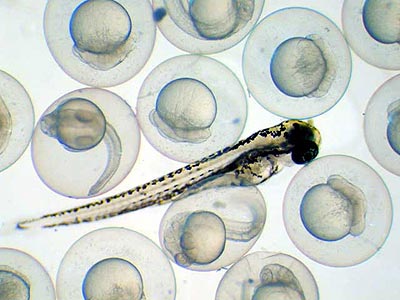"In fact, six different zebrafish strains were found to have some equivalent of human thalassemia, "but only one of these mutants is linked to globin [the component of hemoglobin that accounts for the color of red blood cells]," Zon says. "So there must be five other genes that regulate globin expression, yet nobody knew about them."

 Picture from Pharyngula (where else?)
Picture from Pharyngula (where else?)Along with thalessemia researchers found several other, human blood diseases. Zebra fish are widely used in developmental biology for several reasons. For example, they have short generation times and produce a large number of offspring.

 Also from Pharyngula
Also from Pharyngula The interesting thing about this is that human diseases can be studied in zebra fish and the genetics can be more easily worked out. Of course this research has evolutionary implications, in that we can also study changes in genes between zebrafish and humans - but that's a different post.

 Yup, this one too
Yup, this one tooInteresting Link:The Zebrafish Project Developmental neurobiology for high-school scientists








